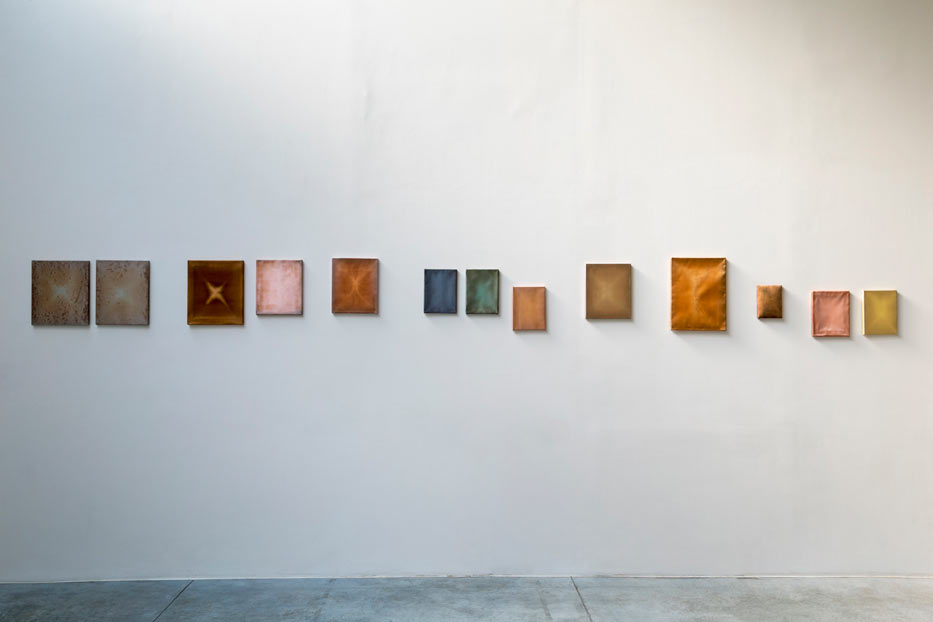
Edith Dekyndt
Photo by Laurent Brandajs
Photo by Laurent Brandajs
Notes on equilibrium
A dialogue with the house of Jean Prouvé II
co-curated with Eleonore de Sadeleer
with Isabelle Andriessen, Vaughn Bell, Julian Charrière, Edith Dekyndt, Stijn Demeulenaere, Bea Fremderman, Tue Greenfort, Carlos Irijalba, Nicolas Lamas, Richard Long, Adrien Tirtiaux, Alvaro Urbano and Maarten Vanden Eynde
Fondation CAB
19.`04.17 - 24.06.17
Ixelles, Brussels
Exhibition Folder
A dialogue with the house of Jean Prouvé II
co-curated with Eleonore de Sadeleer
with Isabelle Andriessen, Vaughn Bell, Julian Charrière, Edith Dekyndt, Stijn Demeulenaere, Bea Fremderman, Tue Greenfort, Carlos Irijalba, Nicolas Lamas, Richard Long, Adrien Tirtiaux, Alvaro Urbano and Maarten Vanden Eynde
Fondation CAB
19.`04.17 - 24.06.17
Ixelles, Brussels
Exhibition Folder
There is the 6th mass extinction.
There is the Anthropocene.
Hard facts.
There is eco-sexuality and the hippie revival of living sustainable.
There are city-farms, organic markets, crowdfunding campaigns for new forests and recycled clothing.
From farm to table, detox-treatments, self-sustainable off-the-grid communities etc.
Why has our connection to nature become so mediated?
Why do we have to pass by statistics and theories to become aware of our own disconnect?
And since when did the Internet become a necessary portal to reach an Instagram-worthy refound and pure connection to nature’? Hashtag natural.
CAB is pleased to announce Notes on our equilibrium, conceived as an invitation into a rediscovered holistic worldview – one in which humankind considers itself indebted to and part of nature’s ecosystems, rather than exploiting them.
The exhibition takes as a departure point the context in which the French architect and designer Jean Prouvé conceived his modular 6×6 Demountable House (1944): a Post-WWII traumatized climate, where a sense of urgency demanded immediate action for change and improvement of living conditions. He provided sustainable and ingenious solutions.
A paradigm shift has occurred since; even though the progresses and the promises of industrialization once were eagerly welcomed, today they have caused for a problematic shift in human respect towards its environment. Anno 2017, we can easily state that we live in a state of emergency. Economic and political conflicts aside, the ecological crisis is looming as a global threat that doesn’t really receive the attention or action it is crying for. The institutionalized disregard for the limits to natural resources is infecting our presence on earth on a scale that cannot be reversed.
Across artworks that manifest themselves as natural phenomena dispersed throughout the exhibition space, Notes on our equilibrium aims to re-ignite consciousness and reflection regarding our impact on the ecosphere.
Works by Adrien Tirtiaux, Richard Long, Bea Fremderman and Edith Dekyndt express the transience of human existence within the larger scope of earth’s chronology. Additionally, unpredictable natural forces predominate our existence on earth, stressing our incapability of ever achieving complete control over this planet.
A denial hereof results in mankind’s pretentious conviction that nature can be artificially mimicked purely for our entertainment. Vaughn Bell, Stijn Demeulenaere and Carlos Irijalba explore the symptoms of this dysfunctional attitude towards nature.
The continuous struggle for power and control over natural resources is degenerating into an aggressive and invasive abuse. Large-scale industrial extraction processes for instance have become part of earth’s landscape, and pollution is only further contributing to this mutation, such as is expressed in works by Julian Charrière, Carlos Irijalba and Maarten Vanden Eynde.
Isabelle Andriessen and Nicolas Lamas explore the age of the Anthropocene, notorious for human influence on the biosphere. Recent exponential automation is only further restructuring the power relations between mankind, nature and technology.
Notes on our equilibrium finally includes a cynical alternative by Alvaro Urbano, whose suggested parallel universe hints at the desire for a tabula rasa and a flight from the chaos that we created.
There is the Anthropocene.
Hard facts.
There is eco-sexuality and the hippie revival of living sustainable.
There are city-farms, organic markets, crowdfunding campaigns for new forests and recycled clothing.
From farm to table, detox-treatments, self-sustainable off-the-grid communities etc.
Why has our connection to nature become so mediated?
Why do we have to pass by statistics and theories to become aware of our own disconnect?
And since when did the Internet become a necessary portal to reach an Instagram-worthy refound and pure connection to nature’? Hashtag natural.
CAB is pleased to announce Notes on our equilibrium, conceived as an invitation into a rediscovered holistic worldview – one in which humankind considers itself indebted to and part of nature’s ecosystems, rather than exploiting them.
The exhibition takes as a departure point the context in which the French architect and designer Jean Prouvé conceived his modular 6×6 Demountable House (1944): a Post-WWII traumatized climate, where a sense of urgency demanded immediate action for change and improvement of living conditions. He provided sustainable and ingenious solutions.
A paradigm shift has occurred since; even though the progresses and the promises of industrialization once were eagerly welcomed, today they have caused for a problematic shift in human respect towards its environment. Anno 2017, we can easily state that we live in a state of emergency. Economic and political conflicts aside, the ecological crisis is looming as a global threat that doesn’t really receive the attention or action it is crying for. The institutionalized disregard for the limits to natural resources is infecting our presence on earth on a scale that cannot be reversed.
Across artworks that manifest themselves as natural phenomena dispersed throughout the exhibition space, Notes on our equilibrium aims to re-ignite consciousness and reflection regarding our impact on the ecosphere.
Works by Adrien Tirtiaux, Richard Long, Bea Fremderman and Edith Dekyndt express the transience of human existence within the larger scope of earth’s chronology. Additionally, unpredictable natural forces predominate our existence on earth, stressing our incapability of ever achieving complete control over this planet.
A denial hereof results in mankind’s pretentious conviction that nature can be artificially mimicked purely for our entertainment. Vaughn Bell, Stijn Demeulenaere and Carlos Irijalba explore the symptoms of this dysfunctional attitude towards nature.
The continuous struggle for power and control over natural resources is degenerating into an aggressive and invasive abuse. Large-scale industrial extraction processes for instance have become part of earth’s landscape, and pollution is only further contributing to this mutation, such as is expressed in works by Julian Charrière, Carlos Irijalba and Maarten Vanden Eynde.
Isabelle Andriessen and Nicolas Lamas explore the age of the Anthropocene, notorious for human influence on the biosphere. Recent exponential automation is only further restructuring the power relations between mankind, nature and technology.
Notes on our equilibrium finally includes a cynical alternative by Alvaro Urbano, whose suggested parallel universe hints at the desire for a tabula rasa and a flight from the chaos that we created.
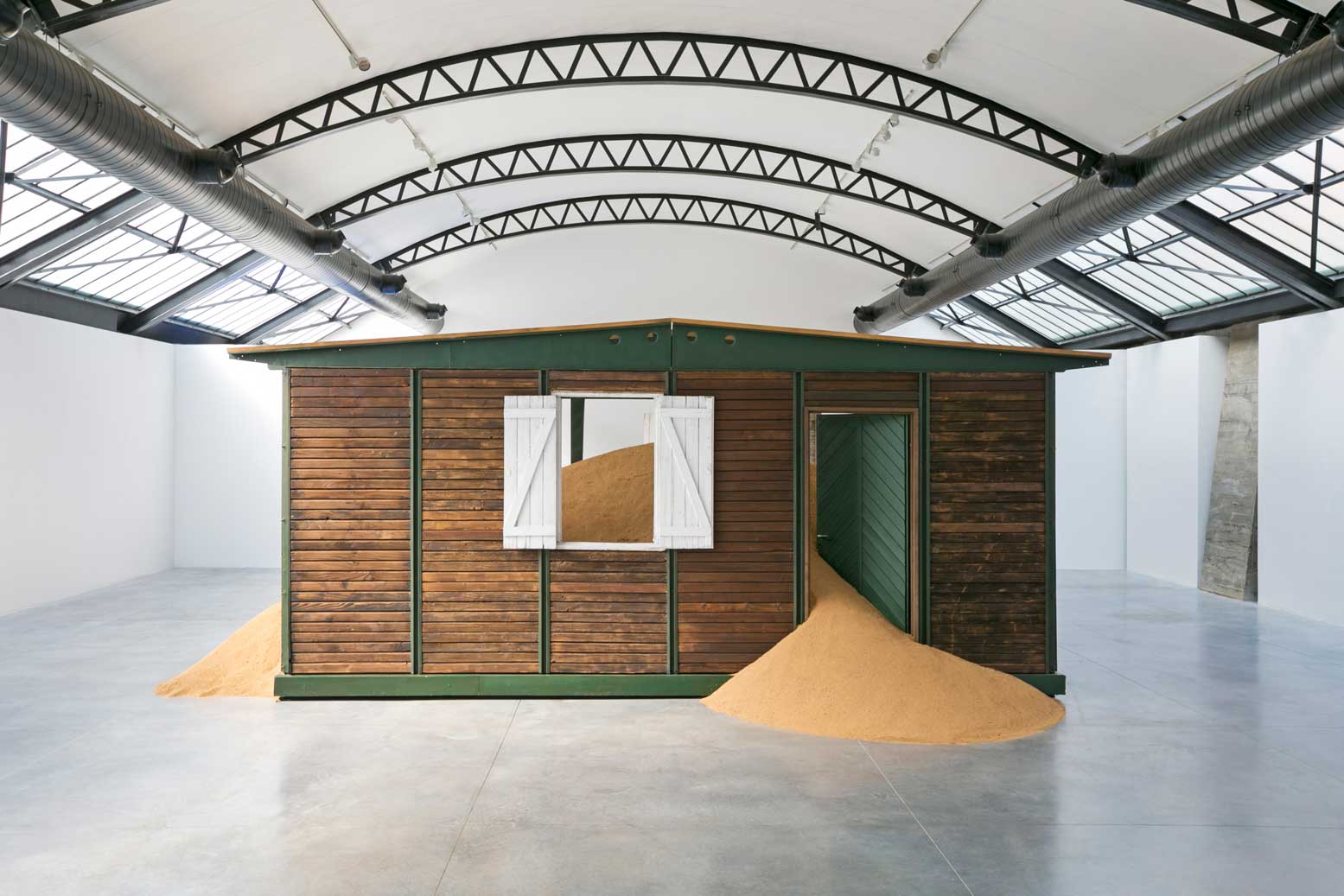
Adrien Tirtiaux in dialogue with Jean Prouvé
Photo by Laurent Brandajs
Photo by Laurent Brandajs
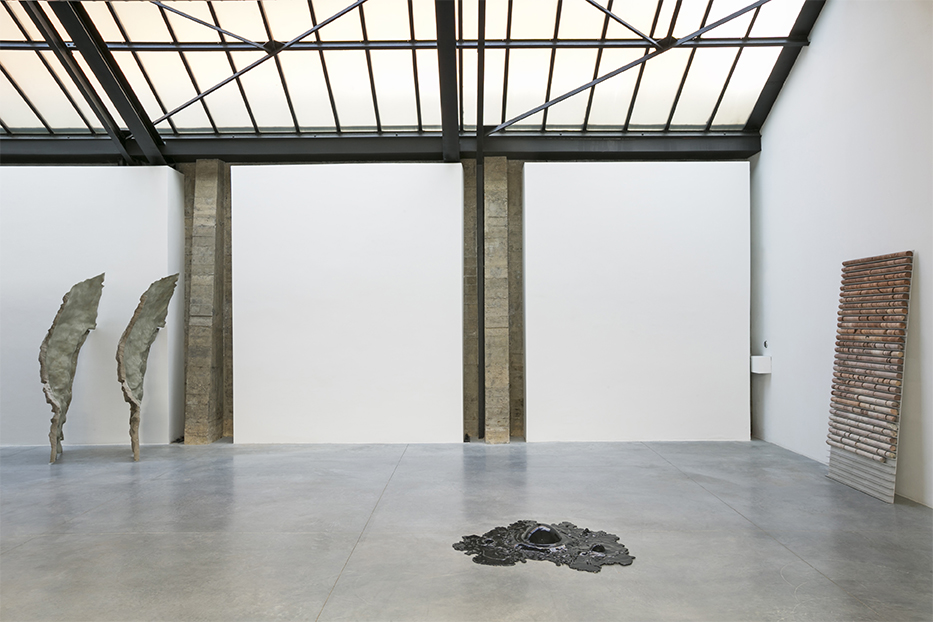
Carlos Irijalba and Maarten Vanden Eynde
Photo by Laurent Brandajs
Photo by Laurent Brandajs
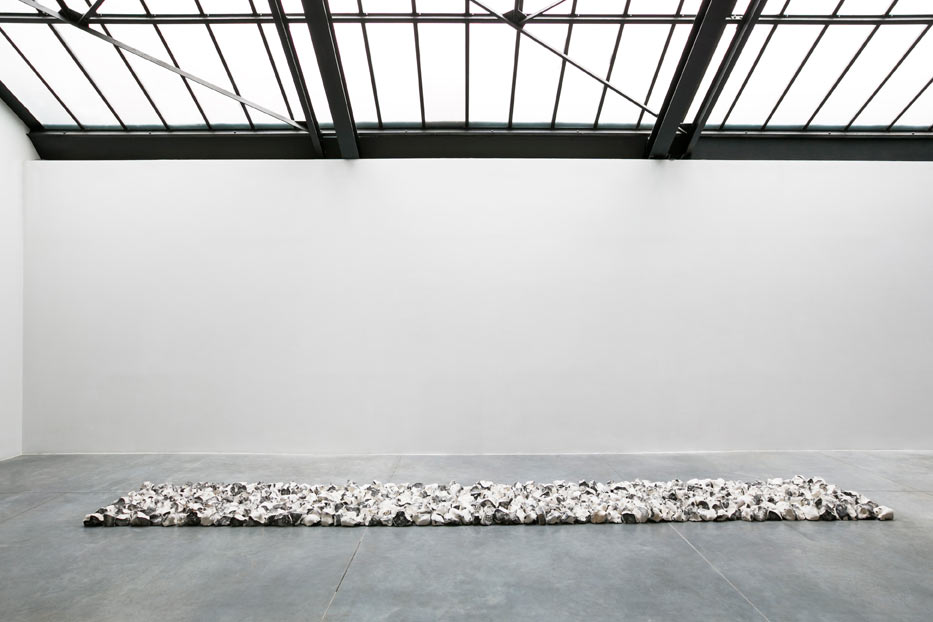
Richard Long
Photo by Laurent Brandajs
Photo by Laurent Brandajs

Julian Charrière
Photo by Laurent Brandajs
Photo by Laurent Brandajs
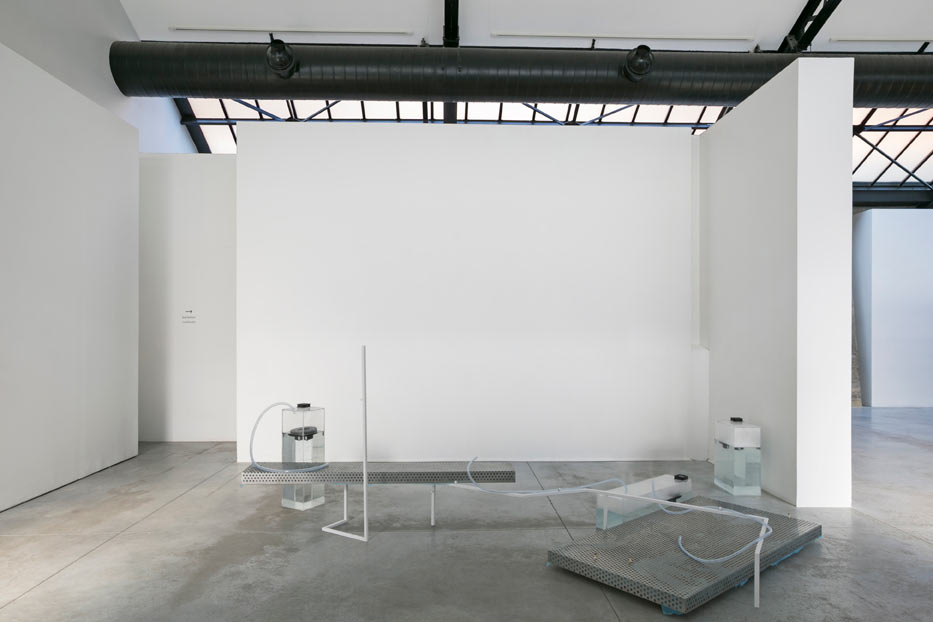
Isabelle Andriessen
Photo by Laurent Brandajs
Photo by Laurent Brandajs
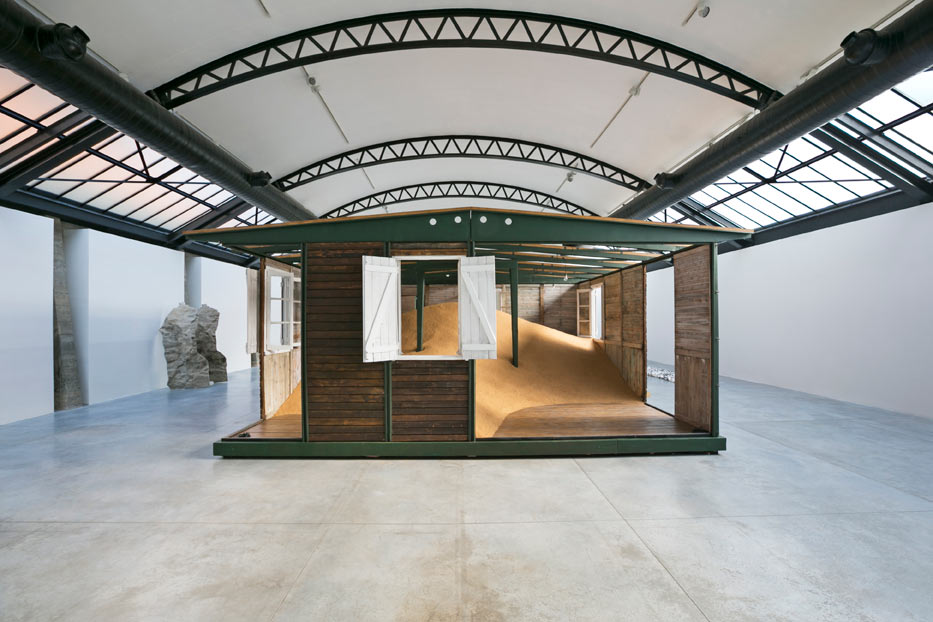
Carlos Irijalba, Adrien Tirtiaux, Jean Prouvé
Photo by Laurent Brandajs
Photo by Laurent Brandajs

Edith Dekyndt
Photo by Laurent Brandajs
Photo by Laurent Brandajs
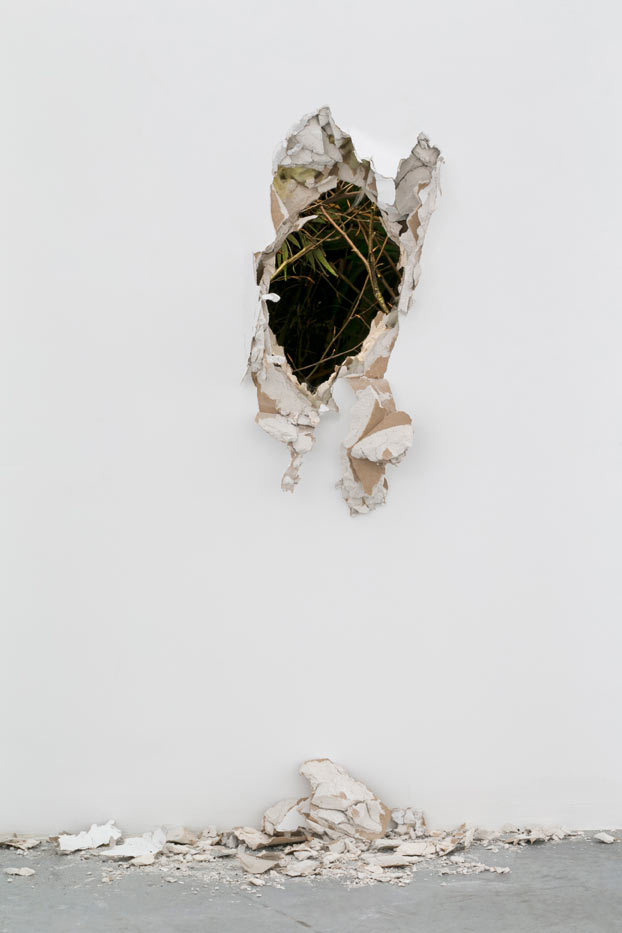
Alvaro Urbano
Photo by Laurent Brandajs
Photo by Laurent Brandajs
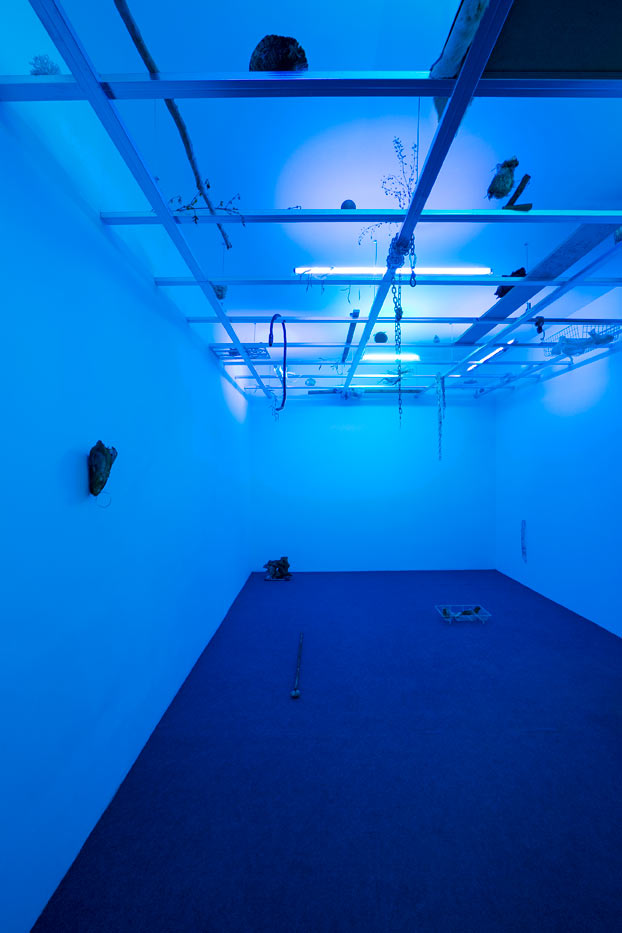
Nicolas Lamas
Photo by Laurent Brandajs